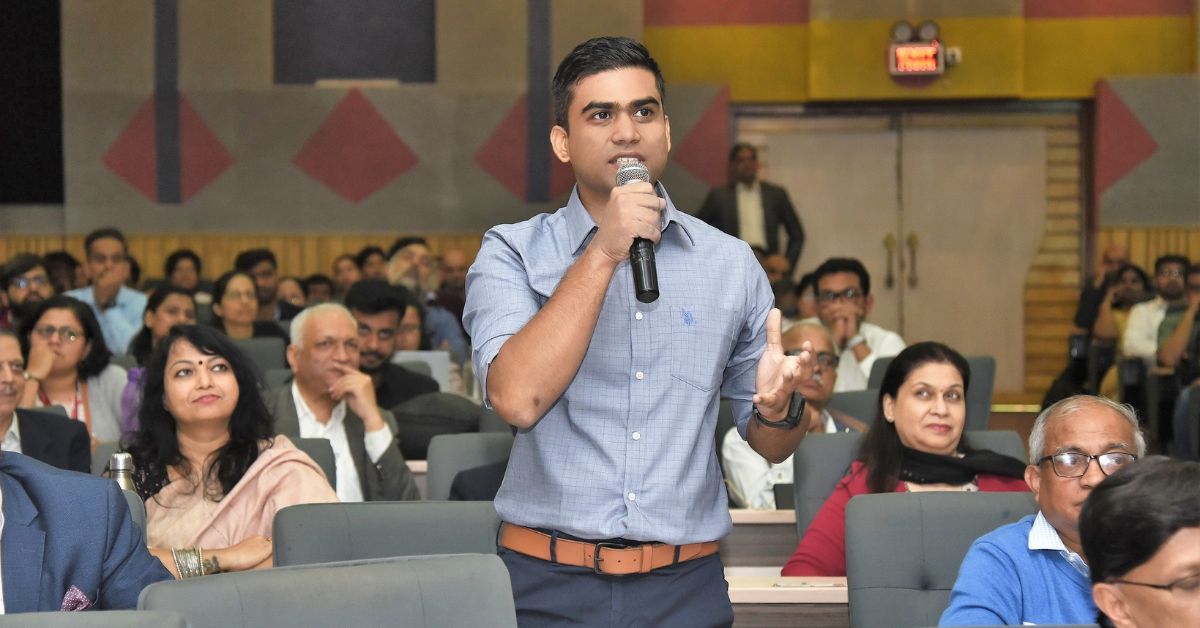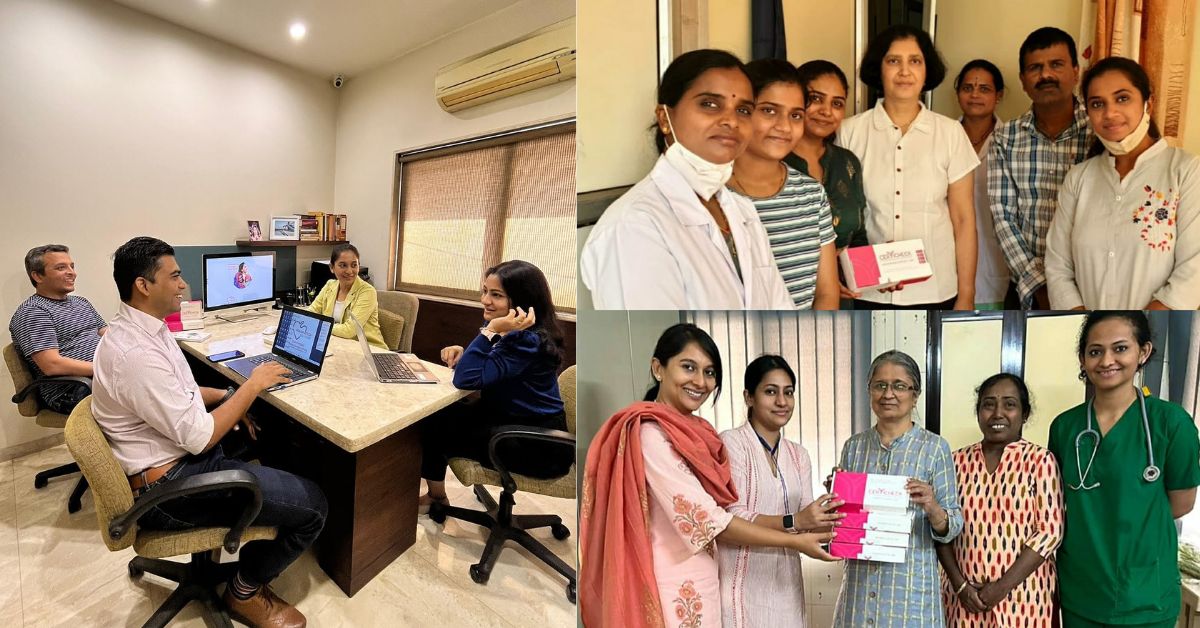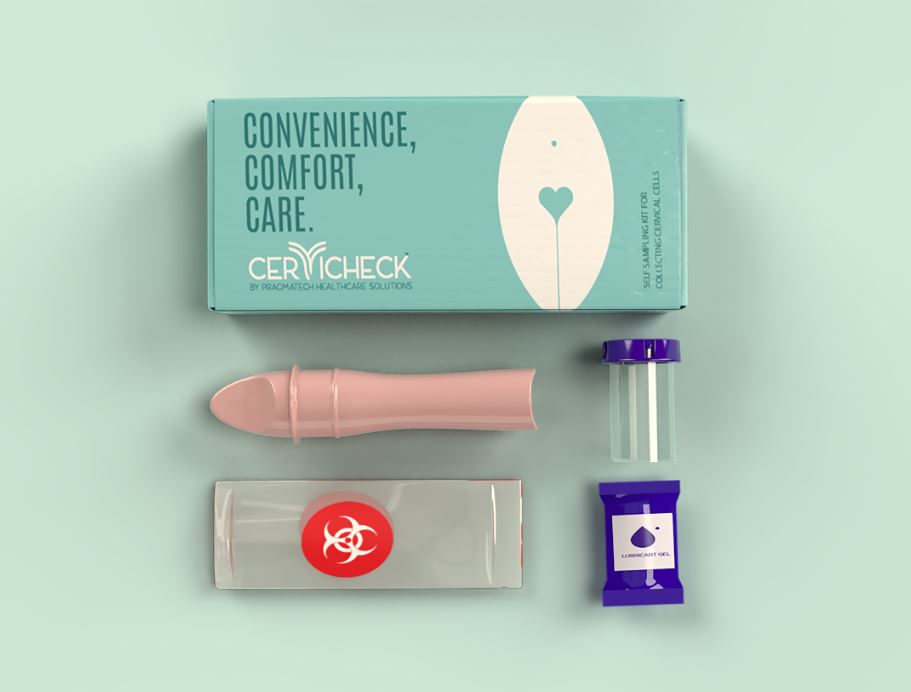Losing their housemaid to cervical cancer in 2019 made Vadodara’s Anirban Palit realise the grim reality of the disease that takes around 75,000 lives every year in India. Despite being preventable, cervical cancer remains one of the leading causes of death in women.
“Our housemaid, who is survived by two young children, was diagnosed with the last stage of cancer, and by the time she reached the doctor, there was nothing much that could have been done,” the 38-year-old tells The Better India.
He adds, “When women are the backbone of any family, one such disease can put the entire family out of order.”
Working on human papillomavirus (HPV) portfolio in a global pharmaceutical company, he realised the gap in the early detection, adoption, and access to HPV tests available in the market. It is to be noted that most cases are caused by HPV, he says.
Anirban wanted to use his expertise and bring innovative technologies at the grassroots level catering specifically to lower-middle-income countries and developing countries like India.

In 2019, Anirban quit his job and co-founded Pragmatech Healthcare Solutions to develop cost-effective healthcare solutions.
“Instead of catering to the global market where only a small population gets the benefit, it was essential to go to the grassroots and innovate solutions that help bring a great difference for the underprivileged,” he says.
So in 2019, he quit his job and co-founded Pragmatech Healthcare Solutions along with his wife Dr Sayantani Pramanik, their childhood friend and lawyer Palna Patel, and gynaecologist Dr Bhagirath Modi with a vision to develop healthcare solutions that are cost-effective.
Besides their domestic help’s death due to delayed diagnosis, Anirban found that usually women are reluctant to go for regular checkups due to time-taking and uncomfortable procedures.
The same year when his wife and co-founder Sayantani went for an annual , she opted to undergo Pap Smear Tests to detect abnormal cell growth in the cervix. A regular Pap test for women between 25 and 65 years is considered the best way to identify precancerous or early-stage cancerous stages.
In a conversation with The Better India, the 37-year-old research scientist says, “I had to wait for 1.5 hours for the gynaecologist to collect the sample. The receptionist kept asking me if I was ready to endure the stress that comes along with the test. For any woman, this would have worsened her fears.”
“After the gynaecologist came, I was asked how many sexual partners I had, and if I was married or not. Such questions are definitely not going to decide if I have a problem, yet they are asked. This embarrassment is one of the major reasons why women avoid going for these tests. What healthy woman undergoing a routine examination would like to assume an awkward position, revealing her intimate areas, and respond to inquiries about her personal life?” she says.

Anirban claims that the self-sampling kit has passed through regulatory requirements by the CDSCO.
As per the World Health Organization (WHO), more than 95 percent of cervical cancer is caused due to HPV. Poor genital health, unprotected sexual intercourse, and multiple sexual partners make women susceptible to this type of cancer.
However, cervical cancer can be cured if diagnosed at an early stage and treated promptly. It takes 15–20 years for cervical cancer to develop in women with normal immune systems. Whereas it takes 5–10 years in women with weakened immune systems, such as those with untreated .
“In India, the adoption of the periodic test is so low that they easily miss this 15-year window. This is despite the symptoms of cervical cancer being heavy bleeding, back and leg pain, and fatigue. Rural women go through these issues on a regular basis and tend to ignore these symptoms. By the time they reach the doctor, they progress to stage 3 or 4 cancer,” she says.
The couple points out that when it comes to cervical screening in rural areas, the government routinely organises camps where a test called Visual Inspection with Acetic Acid (VIA) is conducted.
“An Asha worker assesses the cervical area and checks the presence of precancerous lesions with the naked eye after applying acetic acid. The test isn’t always reliable, and rural women are also reluctant to go for screening at the loss of day’s wage,” points out Anirban.

Anirban claims that Cervicheck can be used by women directly to collect their own samples at home.
The death of their domestic worker, the experience of Sayantani, and the gap in screening and testing together triggered the couple to come up with solutions.
After two years of research, they developed a self-sampling kit – Cervicheck – which they claim can be used by women directly to collect their own samples at home. “This kit gives accurate results, and it can not only do the HPV test but also allows the gynaecologist to further check if the lesions are at the treatable stage or not,” claims Anirban.
His team is also developing a cervical screening kit for rural women with a point-of-care solution that can provide accurate results if they are at risk of developing cervical cancer. “We want to provide an alternate solution to the VIA test which will be easy to use; it would be similar to a COVID ,” he adds.
While he claims that his self-sampling kit has passed through regulatory requirements by the Central Drugs Standard Control Organisation (CDSCO) and should be available to use by July, Anirban says the screening kit is in its final stage and should be launched next year.

The team is also developing a screening kit that can detect if women are at risk of developing cervical cancer.
He continues to add that the self-sampling kit will be available at Rs 200 and the screening kit at Rs 400. “These are very cost-effective as compared to the traditional and current methods of testing which cost between Rs 500–1,000,” he claims.
He further claims that the self-sampling kit which uses the existing HPV real-time PCR kit in labs will have a turn-around of about two days, while the screening kit which is being developed is expected to give the results within 20 minutes.
Anirban says that quitting his job after decade-long work at the MNC was a difficult decision, but his vision to work towards a larger goal helped him stay motivated.
“The problem of cervical cancer was so evident, and a solution was right in front of me. If I didn’t do anything, the thought would have haunted me for the rest of my life. Our kits will help prevent deaths caused by a disease that is preventable,” he says.
(Edited by Pranita Bhat)
“Our housemaid, who is survived by two young children, was diagnosed with the last stage of cancer, and by the time she reached the doctor, there was nothing much that could have been done,” the 38-year-old tells The Better India.
He adds, “When women are the backbone of any family, one such disease can put the entire family out of order.”
Working on human papillomavirus (HPV) portfolio in a global pharmaceutical company, he realised the gap in the early detection, adoption, and access to HPV tests available in the market. It is to be noted that most cases are caused by HPV, he says.
Anirban wanted to use his expertise and bring innovative technologies at the grassroots level catering specifically to lower-middle-income countries and developing countries like India.

In 2019, Anirban quit his job and co-founded Pragmatech Healthcare Solutions to develop cost-effective healthcare solutions.
“Instead of catering to the global market where only a small population gets the benefit, it was essential to go to the grassroots and innovate solutions that help bring a great difference for the underprivileged,” he says.
So in 2019, he quit his job and co-founded Pragmatech Healthcare Solutions along with his wife Dr Sayantani Pramanik, their childhood friend and lawyer Palna Patel, and gynaecologist Dr Bhagirath Modi with a vision to develop healthcare solutions that are cost-effective.
The hesitancy that comes along with diagnosis
Besides their domestic help’s death due to delayed diagnosis, Anirban found that usually women are reluctant to go for regular checkups due to time-taking and uncomfortable procedures.
The same year when his wife and co-founder Sayantani went for an annual , she opted to undergo Pap Smear Tests to detect abnormal cell growth in the cervix. A regular Pap test for women between 25 and 65 years is considered the best way to identify precancerous or early-stage cancerous stages.
In a conversation with The Better India, the 37-year-old research scientist says, “I had to wait for 1.5 hours for the gynaecologist to collect the sample. The receptionist kept asking me if I was ready to endure the stress that comes along with the test. For any woman, this would have worsened her fears.”
“After the gynaecologist came, I was asked how many sexual partners I had, and if I was married or not. Such questions are definitely not going to decide if I have a problem, yet they are asked. This embarrassment is one of the major reasons why women avoid going for these tests. What healthy woman undergoing a routine examination would like to assume an awkward position, revealing her intimate areas, and respond to inquiries about her personal life?” she says.

Anirban claims that the self-sampling kit has passed through regulatory requirements by the CDSCO.
As per the World Health Organization (WHO), more than 95 percent of cervical cancer is caused due to HPV. Poor genital health, unprotected sexual intercourse, and multiple sexual partners make women susceptible to this type of cancer.
However, cervical cancer can be cured if diagnosed at an early stage and treated promptly. It takes 15–20 years for cervical cancer to develop in women with normal immune systems. Whereas it takes 5–10 years in women with weakened immune systems, such as those with untreated .
“In India, the adoption of the periodic test is so low that they easily miss this 15-year window. This is despite the symptoms of cervical cancer being heavy bleeding, back and leg pain, and fatigue. Rural women go through these issues on a regular basis and tend to ignore these symptoms. By the time they reach the doctor, they progress to stage 3 or 4 cancer,” she says.
The couple points out that when it comes to cervical screening in rural areas, the government routinely organises camps where a test called Visual Inspection with Acetic Acid (VIA) is conducted.
“An Asha worker assesses the cervical area and checks the presence of precancerous lesions with the naked eye after applying acetic acid. The test isn’t always reliable, and rural women are also reluctant to go for screening at the loss of day’s wage,” points out Anirban.

Anirban claims that Cervicheck can be used by women directly to collect their own samples at home.
Finding women-friendly solutions
The death of their domestic worker, the experience of Sayantani, and the gap in screening and testing together triggered the couple to come up with solutions.
After two years of research, they developed a self-sampling kit – Cervicheck – which they claim can be used by women directly to collect their own samples at home. “This kit gives accurate results, and it can not only do the HPV test but also allows the gynaecologist to further check if the lesions are at the treatable stage or not,” claims Anirban.
His team is also developing a cervical screening kit for rural women with a point-of-care solution that can provide accurate results if they are at risk of developing cervical cancer. “We want to provide an alternate solution to the VIA test which will be easy to use; it would be similar to a COVID ,” he adds.
While he claims that his self-sampling kit has passed through regulatory requirements by the Central Drugs Standard Control Organisation (CDSCO) and should be available to use by July, Anirban says the screening kit is in its final stage and should be launched next year.

The team is also developing a screening kit that can detect if women are at risk of developing cervical cancer.
He continues to add that the self-sampling kit will be available at Rs 200 and the screening kit at Rs 400. “These are very cost-effective as compared to the traditional and current methods of testing which cost between Rs 500–1,000,” he claims.
He further claims that the self-sampling kit which uses the existing HPV real-time PCR kit in labs will have a turn-around of about two days, while the screening kit which is being developed is expected to give the results within 20 minutes.
Anirban says that quitting his job after decade-long work at the MNC was a difficult decision, but his vision to work towards a larger goal helped him stay motivated.
“The problem of cervical cancer was so evident, and a solution was right in front of me. If I didn’t do anything, the thought would have haunted me for the rest of my life. Our kits will help prevent deaths caused by a disease that is preventable,” he says.
(Edited by Pranita Bhat)
